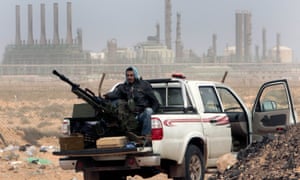Conflict sparked by Benghazi Defence Brigade’s capture from Libyan National Army of terminals at Sidra and Ras Lanuf

An anti-government rebel sits with an anti-aircraft weapon in front of an oil refinery in Ras Lanuf, eastern Libya.
Photograph: Hussein Malla/AP
Ambassadors to Libya from the UK, US and France have made an appeal for calm as Libya falls back into a bloody civil war with rival sides battling for control of the hugely lucrative Libyan oil terminals.
Diplomats are concerned the fighting will severely damage the coastal oil infrastructure – the economic lifeblood of the country.
The fighting was sparked by the Islamist-led Benghazi Defence Brigade’s surprise capture on Friday of the oil export terminals at Sidra and Ras Lanuf.
The terminals were wrested from the control of Field Marshal Khalid Haftar, the head of the so-called Libyan National Army (LNA), a force that dominates in eastern Libya and enjoys Russian and Egyptian support.
Haftar captured the oilfields in September, and the presence of the LNA appeared to have brought enough security to the oil crescent for production to rise from 200,000 barrels a day to close to 700,000.
The oil terminals had been shut for the previous two years while under the control of the rival Petroleum Facilities Guard.
The LNA was reported to be concentrating forces around the port of Brega, still under its control, in order to mount a counterattack, with Haftar willing to call up fresh airstrikes if possible from the United Arab Emirates.
The ambassadors urged all sides to recognise that the oil installations were under the control of the Libyan National Oil Corporation (NOC) and revenues must be sent to the UN-backed government in Tripoli.
Mustafa Sharksi the commander of the BDB, a militia only formed in spring 2016, said in a press conference in Misrata his goal was “to rescue Benghazi from Haftar and return displaced families to their homes”. He said his militia controlled 43 miles (70km) of coast either side of Sidra and Ras Lanuf and would not press on to Benghazi until the NOC had sent another force to take over the oil ports.
The violence has also had political consequences, with Libya’s eastern parliament voting to withdraw its support for a UN peace deal and the UN-backed government in Tripoli. The eastern parliament is close to Haftar and its vote suggests it believes the BDB is working with the Tripoli government.
The loss of the oilfields is also a blow for Haftar’s prestige and has shown the LNA is not as strong as sometimes perceived.
It was also striking that Egypt did not leap to Haftar’s defence. The Egyptian president, Abdel Fatah al-Sisi, was frustrated last month when his efforts to bring about a reconciliation in Cairo between Haftar, representing the east, and Fayez al-Sarraj, the head of the Tripoli government, broke down when Haftar refused to meet him.










